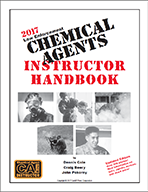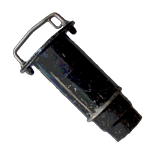Officer Josh Defoe, San Diego Police Department, has brought to our attention a controversy in terminologies. A district attorney has recommended that the term "decontamination" not be used in describing the post-OC cleanup process.  Several people have different ideas as to what you should refer to cleaning off OC and other non-lethal chemicals from suspects. We use to refer to it as "rendering first aid". We stopped using that term many years ago because it has the connotation that we injured the suspect, which we don’t.
Several people have different ideas as to what you should refer to cleaning off OC and other non-lethal chemicals from suspects. We use to refer to it as "rendering first aid". We stopped using that term many years ago because it has the connotation that we injured the suspect, which we don’t.
So what is the answer in today’s world? That is up to you and what your department think. Because one Assistant District Attorney doesn’t like the word doesn’t mean you need to change. I’ve included many different opinions on the subject. You should be familiar with all the ideas and attitudes.
The one thing I agree with in the following opinions is you should write in your report what you did to help alleviate the effects of the non-lethal chemical agent. Anchorage PD uses the term "aftercare". That is very neutral and describes what we do. It connotes that we care about the suspects. If you have to change, that might be a term to adopt.
OC does contaminate
I disagree with the idea that OC does not contaminate  anyone. It does contaminate them with a liquid that is an irritant and causes a burning sensation. Maybe if there were no effects of OC then you would clean it off like you would wipe up spilled milk. But if the substance is one that causes some effect if you touch, inhale, consume, or otherwise get it on you then I say to clean up you are decontaminating.
anyone. It does contaminate them with a liquid that is an irritant and causes a burning sensation. Maybe if there were no effects of OC then you would clean it off like you would wipe up spilled milk. But if the substance is one that causes some effect if you touch, inhale, consume, or otherwise get it on you then I say to clean up you are decontaminating.
Darren Skeries
Training Specialist 2
Iowa DOC
Des Moines, IA
Not a Bad Word
I never thought of decontamination as a bad word. I'm not sure how you could argue that spraying someone with OC doesn't contaminate them with it. And since we use OC precisely for the effects it has on people I would argue that it's a useful tool that is safer for the suspect than other force options we might use instead. Maybe I'm just not sensitive enough to how that language might influence a jury. I like the officers just writing what they did "to help alleviate the effects of the OC."
Sergeant Mike Forbes
Chemical Agent Master Instructor
San Diego Sheriff’s Department
What the dictionary says
The Merriam-Webster dictionary defines contaminate: "to soil, stain, corrupt, or infect by contact or association." Likewise the word decontaminate is defined: "Neutralize or remove dangerous substances, radioactivity, or remove germs from" (an area, object, or person). This implies that OC is dangerous.
Any mention of a "decontamination process" in reports implies that the officer had a process that he routinely follows and that he has been trained in the decontamination of suspects exposed to OC spray. Yet many departments, including my own, do not have a set protocol for dealing with suspects exposed to OC spray.
I believe that you cannot fully "decontaminate" exposed suspects because you cannot fully neutralize the effects of OC. Even after the exposed area has been flushed with copious amounts of water, the suspect often continues to feel discomfort.
 If after you apply OC spray you allow the suspect to wash his face with a garden hose, then write just that in your report. Use simple language and words that you as the author understand, and can explain down the road. Always remember that when a case goes to jury trial your audience is composed of laypersons who have little to no understanding of cop jargon.
If after you apply OC spray you allow the suspect to wash his face with a garden hose, then write just that in your report. Use simple language and words that you as the author understand, and can explain down the road. Always remember that when a case goes to jury trial your audience is composed of laypersons who have little to no understanding of cop jargon.
Deputy Jeff Watson
Use-of-force instructor
San Joaquin County (CA) SO
Revised terminology: political correctness or clarification?
What might appear as a type of political correctness is actually an attempt to help the uninitiated (jurors) better understand what happened. As explained in a very good book by Frank Luntz, It's Not What You Say, It's What People Hear, people don't remember the words you use, they remember and act upon the emotion the words created. It's up to you to create a proper emotional picture by employing words and phrases that lead people to an accurate conclusion.
 The DA was 100% right. If jurors hear that OC had to be DE-contaminated, then that poor person must have been first contaminated by OC. Since he was in so much pain after being contaminated, how can that be right? Contamination is pervasive and scary. Who wants to be in a contaminated environment, or worse be contaminated themselves?
The DA was 100% right. If jurors hear that OC had to be DE-contaminated, then that poor person must have been first contaminated by OC. Since he was in so much pain after being contaminated, how can that be right? Contamination is pervasive and scary. Who wants to be in a contaminated environment, or worse be contaminated themselves?
Using language that is precise in its meaning and intent is actually the opposite of politically correct speech. PC speech serves to gloss over, divert, and deceive. Precise language serves to clarify and provide understanding. Since untrained people, not cops, sit in juries, it makes sense to speak and describe your actions in a manner that gives them the clearest understanding of the events.
George Williams
Training director
Cutting Edge Training, LLC
Bellingham, WA
Misuse of words can be costly
I wholeheartedly agree with the district attorney who disapproved of the use of the term "decontamination." In our respective professions, words matter. Often, something as subtle as the misuse of an emotionally charged term in the wrong setting, such as during a deposition or in the  courtroom, can turn the tide of a close case and unnecessarily result in a costly judgment against an officer.
courtroom, can turn the tide of a close case and unnecessarily result in a costly judgment against an officer.
Dorland's Medical Dictionary for Health Consumers defines "decontamination" as the "freeing of a person or object of some contaminating substance, e.g., war gas, radioactive material, etc." The American Heritage Medical Dictionary similarly defines the term "decontamination" as the "removal or neutralization of a contaminating substance, such as poisonous gas or a radioactive material."
Is this the picture that you want to paint for the public or to a jury? Of course not. To do so is neither wise nor accurate. Choose words wisely--both in your written policies and your training materials as well as in the courtroom.
Asst. Atty. Gen. Stephen Sarnoski
Public Safety Dept.
Hartford, CT
Convey "professional compassion"
Here we term the post-OC process "aftercare" and it's in our policy. It sounds much better in court and in reports if it's inferred that we "care and take care of someone." Be professional, firm, knowledgeable, and forceful if needed, and after it's all over be professionally compassionate and we end up looking as good as possible
Det. John Vandervalk
Anchorage (AK) PD SVU
"More palatable" terminology for juries
I think the advice given by the DA is sound. Sgt. Jim Clark, of the Tulsa (OK) PD and legal section chair for the National Tactical Officers Assn., has for many years advocated the use of SWAT terms that would be more palatable for civil or criminal juries. With his permission, here's a sampling of his suggestions:
Commonly used: Assault
Suggested alternative: Tactical option
Commonly used: Execution
Suggested alternative: Implementation
Commonly used: Explosive entry
Suggested alternative: Breaching
Commonly used: Gas mask
Suggested alternative: Protective mask or chemical agent mask
Commonly used: Kill house
Suggested alternative: Firearms training facility/live-fire house
Commonly used: Neutralize
Suggested alternative: Stop and/or control
Commonly used: Nine principles of war
Suggested alternative: Nine imperative principles
Commonly used: Noise flash grenade (NFG)
Suggested alternative: Flash/sound diversionary
Commonly used: Pain compliance
Suggested alternative: Persuasive compliance
Commonly used: Raid planning
Suggested alternative: Operation planning
Commonly used: Rules of engagement
Suggested alternative: Operational directives
Commonly used: Sniper team
Suggested alternative: Tactical long rifle/observer team
Commonly used: Sniper
Suggested alternative: Long rifleman/tactical precision
Commonly used: Surrender call out
Suggested alternative: Contain and call out
Commonly used: Tear gas
Suggested alternative: Chemical agent or pepper spray
Atty. Scott B. Wood
Certified, Force Science Analysis
Tulsa, OK
Descriptive words shape impressions
As officers, we should know that words do hold a lot of power. The impression you convey when you describe something can change just by what word you use. That's why we have changed from "defensive tactics" to "control tactics." That better describes what we're doing when we use force: controlling the situation. It also gets it out of the officer's mind-set that we are always on the defensive, behind the curve and losing.
Officer Chris Gergen
Waterloo (IA) PD
Education needed on OC reality
We need to educate our criminal justice counterparts by explaining that OC is a less harmful choice, to both the suspect and the officer, than using impact tools or strikes with either hand. The active ingredients in OC are the resins from hot peppers, meant to cause discomfort, not to inflict bodily harm.
Sergeant Dan Danaher
Training coordinator
Livonia (MI) PD





